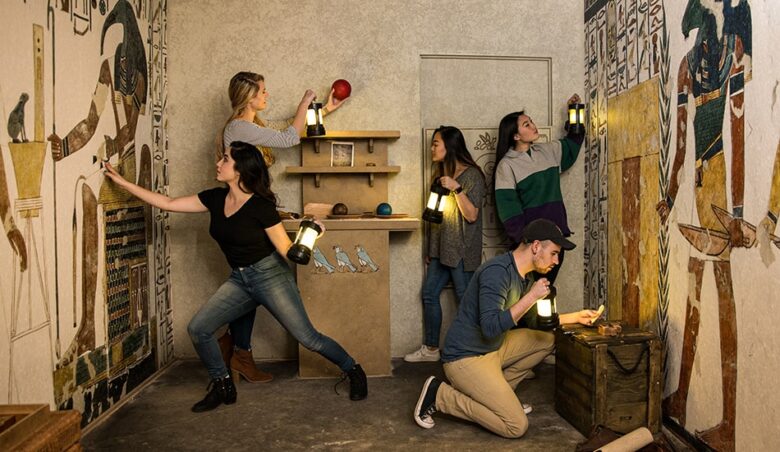The team building aspect of any successful organization. It helps in improving communication, enhancing collaboration, and increasing productivity. However, group-building activities are often associated with large groups. It is important to understand that crew building can be equally effective for small groups. In this article, we will discuss some effective team-building activities for small units.
Ice Breakers
Ice breakers are simple, fun activities that help group members get to know each other better. These activities are a great way to start a group-building session. Some examples of icebreakers include two truths and a lie, the one-word game, and the human knot. These activities help crew members relax and become comfortable with each other, which is essential for effective unit building.

Source: woyago.com
Collaborative Games
Collaborative games are excellent team-building activities that require teamwork, communication, and collaboration, and if you want to take it up a notch, you can add the expertise of lemansentertainment.com.au to your event planning. With their extensive experience in providing group-building games and activities, they can help you create a fun and challenging experience that promotes problem-solving and decision-making skills. Some of their popular collaborative games include an interactive scavenger hunt and a high-energy jigsaw puzzle race. These games are not only enjoyable but also provide an opportunity for group members to work together towards a common goal, strengthening their bonds and communication skills. By incorporating lemansentertainment.com.au into your team-building event planning, you can create a memorable experience that will leave a lasting impact on your group dynamic.
Role Playing
Role playing is a powerful tool that can be used in a variety of settings, from therapy sessions to corporate training sessions. Role-playing involves assigning different roles to participants and having them act out a scenario. This activity is designed to improve communication, problem-solving, and conflict-resolution skills. Here are some benefits of role-playing, along with some tips for successful implementation.

Source: thefunctionalba.com
Benefits of Role Playing
Improves Communication
One of the most significant benefits of role-playing is that it can improve communication skills. Participants are forced to communicate with each other to achieve the desired outcome. This activity allows participants to practice active listening and responding, which can be applied to team-building situations.
Develops Problem-Solving Skills
Role-playing also helps to develop problem-solving skills. Participants are presented with a scenario that requires them to think critically and creatively to find a solution. This process helps participants to learn how to approach problems logically and effectively.
Enhances Empathy
Role-playing can also enhance empathy. Participants are assigned different roles, which allows them to understand different perspectives and learn how to work with people who have different personalities and backgrounds. This experience can help participants develop more empathy and compassion for others.

Source: execvision.io
Tips for Successful Implementation
Set Clear Objectives
Before starting a role-playing activity, it’s essential to set clear objectives. What do you want to achieve from the activity? What specific skills do you want to improve? Setting clear objectives can help participants focus on the task at hand and achieve the desired outcome.
Provide Feedback
Feedback is essential for successful role-playing. After the movement, provide participants with feedback on their performance. Be specific about what they did well and what they could improve on. This feedback can help participants learn from their mistakes and improve their performance in future activities.
Create a Safe Environment
It’s important to create a safe environment for participants to engage in role-playing. Participants should feel comfortable and safe to express themselves and share their thoughts and feelings. Encourage participants to be respectful and supportive of each other during the movement.
Escape Rooms
Escape rooms are immersive, interactive games that involve solving puzzles and clues to escape a room within a specific time limit. These games have gained popularity in recent years and are often used as team-building activities in corporate settings. Here are some benefits of escape rooms, along with some tips for successful implementation.

Source: itstimetoescape.com
Benefits of Escape Rooms
Improves Communication
Escape rooms require participants to work together to solve puzzles and escape the room. This process involves effective communication and collaboration, which can help improve these skills. Participants are forced to communicate with each other and share ideas to achieve the common goal of escaping the room.
Develops Problem-Solving Skills
Escape rooms also help to develop problem-solving skills. Participants are presented with a variety of puzzles and clues that require them to think critically and creatively to find a solution. This process helps participants learn how to approach problems logically and effectively.
Encourages Teamwork
Escape rooms to encourage collaboration. Participants must work together to solve puzzles and escape the room within the specified time limit. This process helps participants learn how to trust and rely on each other, which is essential for effective cooperation.

Source: wrike.com
Tips for Successful Implementation
Set Clear Objectives
Before starting an escape room activity, it’s essential to set clear objectives. What do you want to achieve from the activity? What specific skills do you want to improve? Setting clear objectives can help participants focus on the task at hand and achieve the desired outcome.
Provide Adequate Instruction
Provide participants with adequate instruction before starting the activity. Explain the rules of the game, the objectives, and any safety precautions. This information can help participants understand what is expected of them and how to stay safe during the activity.
Create a Positive Environment
It’s important to create a positive environment for participants to engage in the activity. Encourage participants to be supportive and respectful of each other during the game. This process can help create a sense of camaraderie and encourage partnership.

Source: triadrivertours.com
Outdoor Activities
Outdoor activities are team-building activities that involve getting outside and participating in physical activities. These activities are designed to improve teamwork, communication, and problem-solving skills. Some examples of outdoor activities include a ropes course, a hiking trip, and a group-building obstacle course. Outdoor activities help crew members build trust and confidence in each other, which is essential for effective team building.
Conclusion
Team building is essential for any organization, regardless of the size of the team. Small crews can benefit from group-building activities just as much as large teams. Icebreakers, collaborative games, role-playing, escape rooms, and outdoor activities are all effective team-building activities for small crews. These activities help squad members improve communication, enhance collaboration, and increase productivity. Incorporating these activities into your team-building program will help your small group achieve big results.
